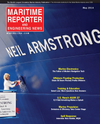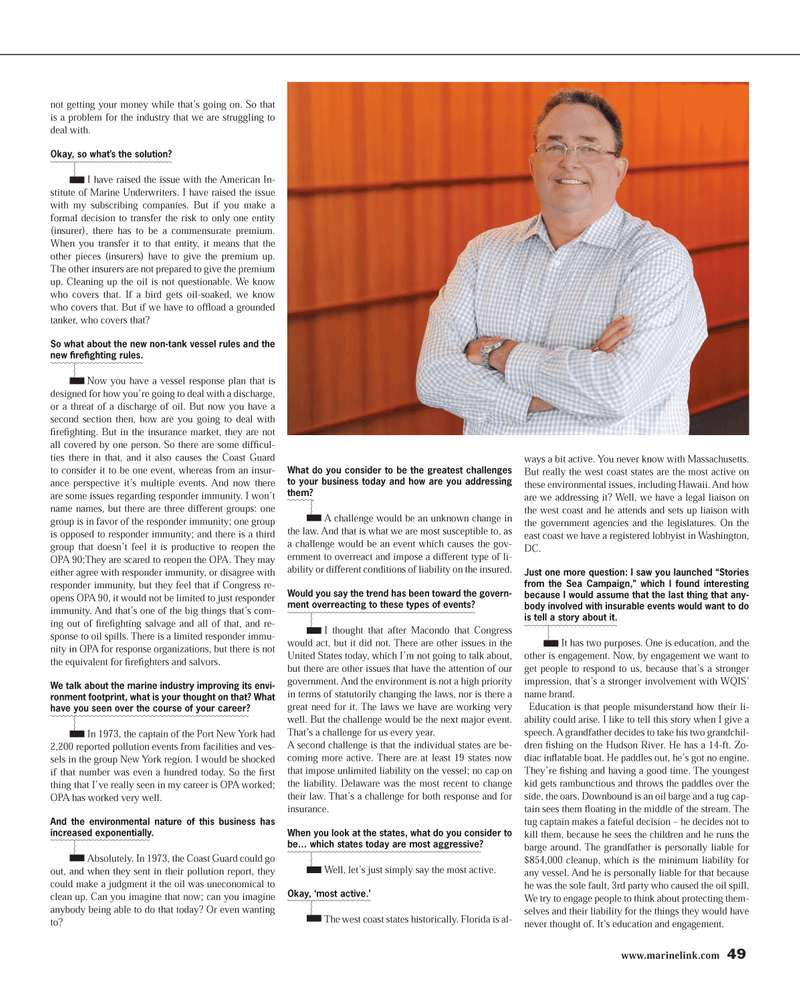
Page 49: of Maritime Reporter Magazine (May 2014)
Marine Electronics Edition
Read this page in Pdf, Flash or Html5 edition of May 2014 Maritime Reporter Magazine
www.marinelink.com 49 not getting your money while that’s going on. So that is a problem for the industry that we are struggling to deal with.
Okay, so what’s the solution? I have raised the issue with the American In- stitute of Marine Underwriters. I have raised the issue with my subscribing companies. But if you make a formal decision to transfer the risk to only one entity (insurer), there has to be a commensurate premium.
When you transfer it to that entity, it means that the other pieces (insurers) have to give the premium up.
The other insurers are not prepared to give the premium up. Cleaning up the oil is not questionable. We know who covers that. If a bird gets oil-soaked, we know who covers that. But if we have to offl oad a grounded tanker, who covers that?
So what about the new non-tank vessel rules and the new fi refi ghting rules. Now you have a vessel response plan that is designed for how you’re going to deal with a discharge, or a threat of a discharge of oil. But now you have a second section then, how are you going to deal with fi refi ghting. But in the insurance market, they are not all covered by one person. So there are some diffi cul- ties there in that, and it also causes the Coast Guard to consider it to be one event, whereas from an insur- ance perspective it’s multiple events. And now there are some issues regarding responder immunity. I won’t name names, but there are three different groups: one group is in favor of the responder immunity; one group is opposed to responder immunity; and there is a third group that doesn’t feel it is productive to reopen the
OPA 90;They are scared to reopen the OPA. They may either agree with responder immunity, or disagree with responder immunity, but they feel that if Congress re- opens OPA 90, it would not be limited to just responder immunity. And that’s one of the big things that’s com- ing out of fi refi ghting salvage and all of that, and re- sponse to oil spills. There is a limited responder immu- nity in OPA for response organizations, but there is not the equivalent for fi refi ghters and salvors.
We talk about the marine industry improving its envi- ronment footprint, what is your thought on that? What have you seen over the course of your career? In 1973, the captain of the Port New York had 2,200 reported pollution events from facilities and ves- sels in the group New York region. I would be shocked if that number was even a hundred today. So the fi rst thing that I’ve really seen in my career is OPA worked;
OPA has worked very well.
And the environmental nature of this business has increased exponentially. Absolutely. In 1973, the Coast Guard could go out, and when they sent in their pollution report, they could make a judgment it the oil was uneconomical to clean up. Can you imagine that now; can you imagine anybody being able to do that today? Or even wanting to?
What do you consider to be the greatest challenges to your business today and how are you addressing them? A challenge would be an unknown change in the law. And that is what we are most susceptible to, as a challenge would be an event which causes the gov- ernment to overreact and impose a different type of li- ability or different conditions of liability on the insured.
Would you say the trend has been toward the govern- ment overreacting to these types of events? I thought that after Macondo that Congress would act, but it did not. There are other issues in the
United States today, which I’m not going to talk about, but there are other issues that have the attention of our government. And the environment is not a high priority in terms of statutorily changing the laws, nor is there a great need for it. The laws we have are working very well. But the challenge would be the next major event.
That’s a challenge for us every year.
A second challenge is that the individual states are be- coming more active. There are at least 19 states now that impose unlimited liability on the vessel; no cap on the liability. Delaware was the most recent to change their law. That’s a challenge for both response and for insurance.
When you look at the states, what do you consider to be… which states today are most aggressive? Well, let’s just simply say the most active.
Okay, ‘most active.’ The west coast states historically. Florida is al- ways a bit active. You never know with Massachusetts.
But really the west coast states are the most active on these environmental issues, including Hawaii. And how are we addressing it? Well, we have a legal liaison on the west coast and he attends and sets up liaison with the government agencies and the legislatures. On the east coast we have a registered lobbyist in Washington,
DC.
Just one more question: I saw you launched “Stories from the Sea Campaign,” which I found interesting because I would assume that the last thing that any- body involved with insurable events would want to do is tell a story about it. It has two purposes. One is education, and the other is engagement. Now, by engagement we want to get people to respond to us, because that’s a stronger impression, that’s a stronger involvement with WQIS’ name brand.
Education is that people misunderstand how their li- ability could arise. I like to tell this story when I give a speech. A grandfather decides to take his two grandchil- dren fi shing on the Hudson River. He has a 14-ft. Zo- diac infl atable boat. He paddles out, he’s got no engine.
They’re fi shing and having a good time. The youngest kid gets rambunctious and throws the paddles over the side, the oars. Downbound is an oil barge and a tug cap- tain sees them fl oating in the middle of the stream. The tug captain makes a fateful decision – he decides not to kill them, because he sees the children and he runs the barge around. The grandfather is personally liable for $854,000 cleanup, which is the minimum liability for any vessel. And he is personally liable for that because he was the sole fault, 3rd party who caused the oil spill.
We try to engage people to think about protecting them- selves and their liability for the things they would have never thought of. It’s education and engagement.
MR #5 (42-49).indd 49 4/30/2014 3:58:36 PM

 48
48

 50
50
